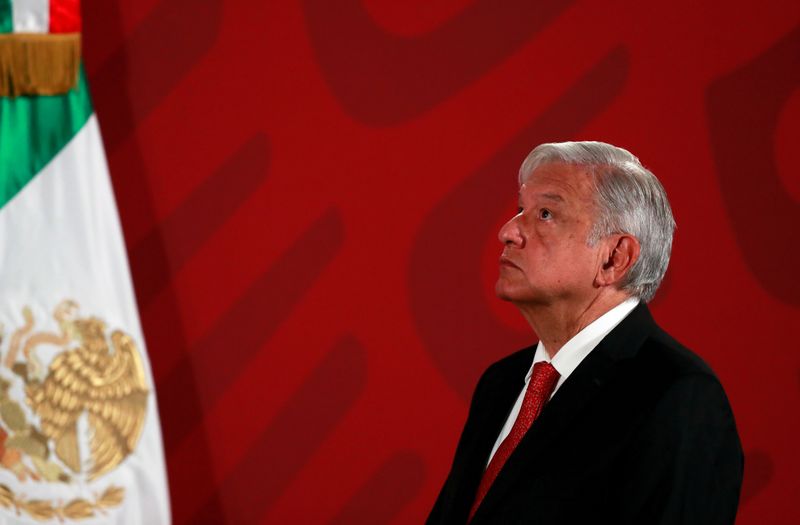
FILE PHOTO: Mexico’s President Andres Manuel Lopez Obrador holds a news conference at the National Palace in Mexico City, Mexico, March 17, 2020. REUTERS/Henry Romero/File Photo
April 19, 2020
By Dave Graham
MEXICO CITY (Reuters) – Mexican business leaders fed up with President Andres Manuel Lopez Obrador are beginning to marshal support for political outsiders to weaken him at the ballot box next year, in an unfolding strategy that may also fuel greater division.
Lopez Obrador has alarmed investors with idiosyncratic policymaking since taking office. Now, his reluctance to help companies through the coronavirus pandemic with relief measures has pushed even business allies to vent their frustration.
Carlos Salazar, head of the Business Coordinating Council (CCE) and a key interlocutor between the president and big business, last week suggested using a 2022 referendum planned by Lopez Obrador on his presidency to vote him out.
Since then, business has become more open about using the ballot box to change the direction of the country.
Lopez Obrador’s National Regeneration Movement (MORENA) and its allies control both houses of Congress. But critics hope they can end that when a new lower house is elected in June 2021.
Jose Arturo Sanchez, head of the CCE in the central city of Leon, said that because opposition parties are widely discredited, business groups were looking to candidates without political baggage.
“We at least need to pick good candidates of the citizen kind who aren’t so tarnished,” Sanchez said.
Talks over non-aligned candidates are underway between the opposition and civil society organizations including business groups, academics, environmentalists and human rights advocates, said Fernando Belaunzaran, co-leader of the opposition center-left Party of the Democratic Revolution (PRD).
Lopez Obrador has clashed with a number of prominent civil society groups since taking office in December 2018.
To maximize its chance of success in 2021, the opposition is mulling electoral alliances and avoiding fielding competing candidates, said Belaunzaran.
“But it’s still early days,” he said.
To focus too much on the 2021 ballot now, Belaunzaran said, risked playing to Lopez Obrador’s strategy of confrontation and increasing division during the economic crisis.
“That strengthens more extreme positions,” he said. “A good opposition bloc needs to be built moving toward the center.”
As president, Lopez Obrador has repeatedly warned that “neoliberal” and “conservative” business and political adversaries devoted to the “corrupt” economic model of his predecessors are bent on thwarting him.
That narrative plays well with his base who, like Lopez Obrador, say corporate opponents schemed with his political foes to rob him of the 2006 presidential election.
The resistance he prophesied is increasingly becoming reality just as companies seek help to weather the coronavirus.
“It’s like a chronicle of a failure foretold,” said Sanchez in Leon. “More than that. It’s worse than we thought it would be.”
Lopez Obrador said this week that “fronts are forming against me and there’s a whole campaign of slander, dirty war, complete lies,” and likened criticism of his government to that faced by President Francisco Madero, a hero of the Mexican Revolution who was betrayed and murdered in a U.S.-backed coup.
The conflict risks aggravating a recession that began in 2019 when investment fell sharply amid uncertainty over Lopez Obrador’s management of the economy, which analysts say could shrink by up to 10% this year.
COMPROMISE
With sales plummeting during the shutdown, executives are furious that instead of giving them more time to pay their tax bills, Lopez Obrador has accused companies of exploiting the crisis to fire workers, and said there will be no bailouts for the rich.
In response, some are threatening to not pay taxes until the economy recovers from the coronavirus, particularly in northern border states such as Chihuahua and Tamaulipas.
Lopez Obrador has alarmed investors by questioning previously signed deals, holding referendums against investment projects he opposes, and threatening to tear up billions of dollars in infrastructure contracts.
Businesses are now wary of risking capital, “apart from the big companies that have a relationship with the government,” said Sanchez in Leon, reflecting concern that under Lopez Obrador, smaller firms lack a voice.
“It’s made us consider politics, and to look for and support people best suited to getting the country out of the big problem it’s in,” said Francisco Santini, head of the CCE in Chihuahua.
The bad blood has prompted calls from elder statesmen for compromise.
“There needs to be an agreement between the government, the business sector and organized labor over a new social consensus,” said David Ibarra, a former finance minister.
There are some signs the government is listening.
On Thursday, Lopez Obrador announced he would provide one million additional loans to small businesses.
Later that day, Luis Nino de Rivera, head of the private banking association, said his group was working with authorities to help smaller firms with state funds and federal guarantees.
But Santini in Chihuahua said he did not believe the president would change.
“Today, we can see we’ve got nowhere,” he said. “Quite the opposite: his ideology has just become stronger.”
(Reporting by Dave Graham; Editing by Daniel Wallis)

